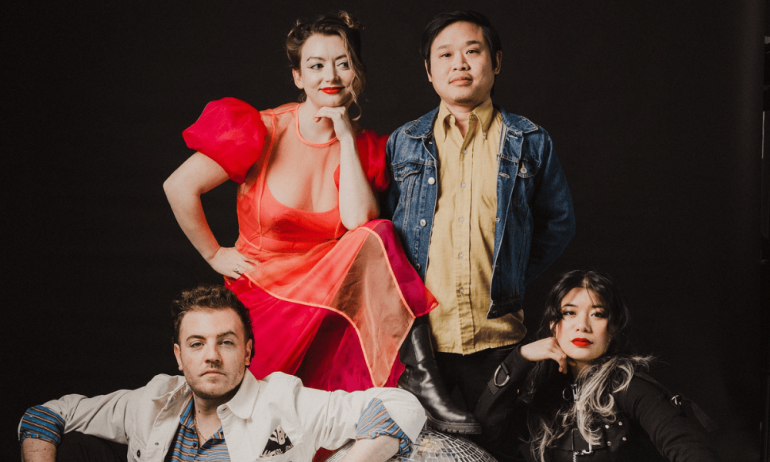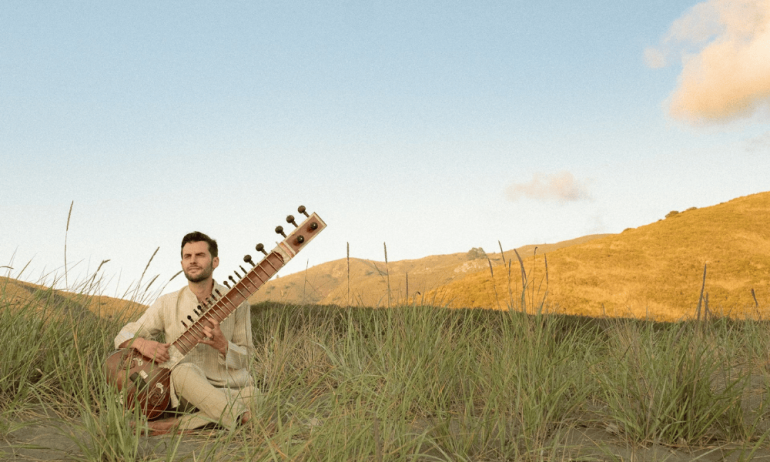Cellista is a performance artist with creative roots in the Bay Area and Colorado. She creates stage poems like her one-woman show, Élégie, for cello, static trapeze, and cinema. Élégie will debut at the Gordon Gamm Theater in Boulder on March 23rd.
Here to tell us about the performance and much more is Cellista. Welcome to KGNU!
Hey, thanks for having me.
Can you tell our listeners about your artistic story and how you got to where you are today?
I got started in the public middle school program at Sunset Middle School in Longmont. A string quartet came to my elementary school, and they were doing an outreach concert. They came in, and they played some Beethoven string quartets.
I happened to be sitting on the floor near the cellist, and I remember feeling the vibrations on the floor as they played, particularly the cello. And I just fell in love with the cello! So, I feel like the cello picked me in some ways.
Once I got into the school orchestra, I was pretty serious, and the music director advised my parents that I should start private lessons, which proved life-changing.
I started studying with a cellist named Maggie Noble for a few years in Longmont, and then I shifted over to Judith Glyde at CU Boulder and Charles Lee, and I think he still plays principal for Boulder Phil. Skipping forward, I went to Metro State College, where I was studying cello performance and political science. I met my now husband at a Denver goth club called Rock Island, which is currently closed.
 He’s French, and when I met him, he was on a postdoc, doing work in physics. When we met, his visa ran out, and I followed him to France, where I lived for several years. During that time, I stopped playing cello altogether, and eventually, I think homesickness led us to move back to the United States.
He’s French, and when I met him, he was on a postdoc, doing work in physics. When we met, his visa ran out, and I followed him to France, where I lived for several years. During that time, I stopped playing cello altogether, and eventually, I think homesickness led us to move back to the United States.
And that’s when we landed in San Jose, California, in the Bay Area. That’s when I think my creative life and career truly began. I auditioned on a whim at San Francisco State. I got a pretty big scholarship, which surprised me because I did this thing on a whim. But I felt like I needed to go, so I started attending school, and at the same time, I started connecting with many artists across disciplines, primarily visual artists. And many of whom I found just via this art gallery in downtown San Jose called Anno Domini. And I used to busk in front of the gallery on First Fridays. And it wasn’t long before the gallery owners invited me inside to play.
I just started connecting with all these artists. At the same time, I started playing for bands, and I developed my skills as a session musician.
And since then, I’ve been fortunate to accompany some fantastic artists. Some of them include Van Dyke Parks, Boots Riley from The Coup, Tanya Donnelly, and my personal favorite is Tony! Toni! Toné! I don’t know if anyone remembers them. It’s from there I just learned how to play live.
I got myself a loop station. I started composing with it. That led somehow to me starting to produce my multimedia stage pieces. And I call these stage poems.
I started accompanying circus performers, ensembles, and dance companies… just making a living in the Bay Area. And I think, honestly, it was only a matter of time.
I think I crossed a threshold, and I started taking lessons on static trapeze, and that was about two years ago. And I can’t remember what even led me to sign up for the first class. I can’t remember taking the first class. It felt like, just like with the cello, a static trapeze chose me.
And it felt like static trapeze was this ideal apparatus for the storytelling I wanted to do. So that’s my story.
So, do you play cello while you’re on trapeze? Is that a thing? How do you do it?
I’ve had to do unorthodox things to find comfortable playing positions. So, for instance, I use a guitar strap on the cello, which I can anchor to me because I don’t have the end pin while I’m up there.
Let’s discuss your upcoming show Élégie. I want to ask you what a stage poem is and what the audience can look forward to. I’ve seen some of your work online, and I love the photography that goes along with this, but please tell our listeners about the upcoming show and what precisely a stage poem is.
Élégie is a stage poem, a one-woman show for cello, static trapeze, and cinema… what I would call a multimedia theatrical piece. It contains literature, visual art, and some movement, whether dance or whatnot. Usually, the soundtrack is my musical composition.
I play the character of Élégie, a blackbird who shapeshifts into human form and back and is accompanied everywhere by her companion, the cello.
Élégie awakens one day in her magical tree outside the walled-off city of Cloutier to find that its entire population has disappeared.
 In their departure, the citizens left behind a city of altars that were decorated with candles. Each altar contains the memories and mementos of the banished citizens, and Élégie finds these as she journeys. So, she has an illuminating walk, which I call a journey of remembrance and testimony, with many different elements, including fear.
In their departure, the citizens left behind a city of altars that were decorated with candles. Each altar contains the memories and mementos of the banished citizens, and Élégie finds these as she journeys. So, she has an illuminating walk, which I call a journey of remembrance and testimony, with many different elements, including fear.
There are stories of love, loss, joy, grief, and anguish, and some of these stories she encounters lead her to flee to her magical tree because she’s terrified of the truth that she’s seen. And at the end of this, you know, she feels a calling to return in her human form to cloture. And so, I think of the stage poem as a stage poem about serenity.
I would say maybe a year and a half ago. I think the first prompt came from an exhibit I saw at the Denver Art Museum featuring the work of Rick Bartow. There was a painting I saw that he created called Crow Dance, and It pulled me in, and I remember seeing it, and I felt compelled to sit on the floor beneath it, and I think I hung out there for about an hour.
I needed to see it. I returned several times to visit, and the painting I saw represented a crow’s transformation into a human. I looked him up; he was a Vietnam veteran, musician, songwriter, and Native American. His body of work examines many of the concepts I’m fascinated with and have attempted to look at within my work.
That was a very resonant moment, and that’s when Élégie was hatched. His work was the impetus; it pushed her out of my head and into the world. And then, from there, I started pre-writing, and that’s how things started. That’s kind of the story of how she was, came to of how she was named, I think, very simply; what I’m trying to say.
Your press release says the project is “unapologetically feminist.” Can you elaborate?
I’m a woman working in the entertainment industry. I’m a woman who, at the age of 41, is daring to self-produce nearly every aspect of my career and every project I create. I feel unapologetic in my want to tell my story through whatever means I think is best. Élégie demonstrates that radical action of daring to tell my story and hopefully create platforms for other voices to tell theirs, and I hope to have their stories not only listened to but heard. And so, in that manner, I think this is unapologetically feminist.
You’re also releasing a 16-track album for Élégie on Bandcamp on the same day as the performance. Can you talk about the album?
The album is the soundtrack to the stage poem. It’s the soundtrack, too. It’s an album curated from my existing catalog of compositions, and it was curated to help tell Élégie’s story. Much of it comes from my first full-length album, Finding San Jose, but it also includes many original music composed for her.
Thanks for stopping by KGNU, Chalista.
Thank you so much for having me.
Show Info
Event: Cellista’s Élégie
When: Saturday, March 23
Venue: Gordon Gamm Theater
2590 Walnut Street, Boulder
Showtime: 7:30 p.m.
More info: https://thedairy.org/event/cellistas-elegie/
About the author: From the San Francisco Bay Area to the Big Island of Hawaii, Steve Roby has worked as a journalist, entertainment photographer, magazine editor, radio host (San Francisco, Hawaii, and Denver), and video documentarian. Since 1989, he has been writing about music and interviewing musicians. Roby is also a published author of three books, one on the L.A. Times Non-Fiction Hardcover Best Seller List.
This interview has been edited for clarity and continuity.



















